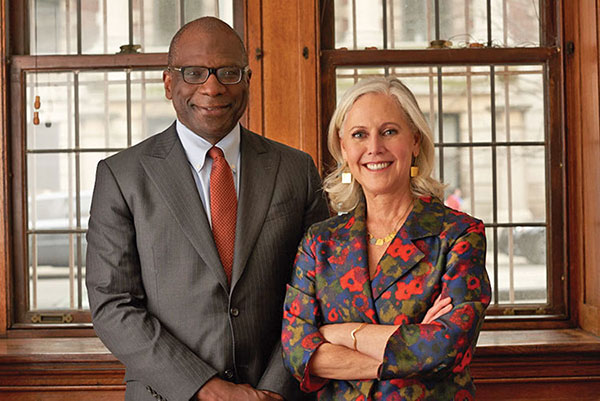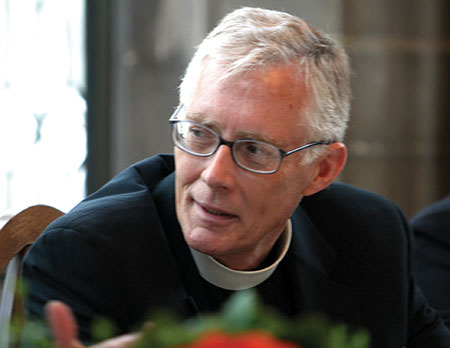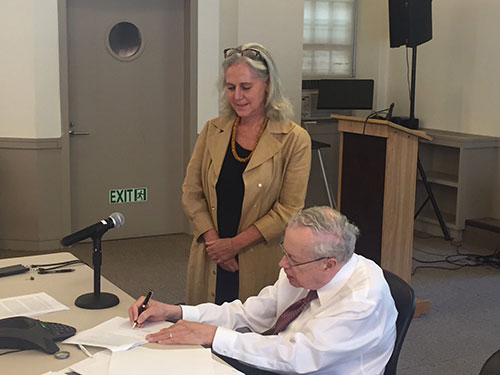We were facing a ticking clock, losing $8 million a year,” explains the Rev. Gary Hall, chair of the board of trustees at Episcopal Divinity School (EDS) in Cambridge, Massachusetts. Assets had decreased by 8.5 percent in 2015 and then plummeted by 11 percent in 2016. “You can only do that for so long,” he says.
The situation was familiar to Hall, who, a decade earlier, had presided over the final years of another struggling Episcopal institution. “I didn’t want to be the Dr. Kevorkian of theological education,” he says. So he told his board colleagues, “We’ve got to act. Now.”
They briefly considered merging with a university but feared the seminary would lose its identity, be absorbed by the larger school, and be reduced to a program or memorialized on a plaque. Partnering with another small seminary was a possibility but might put their financial resources — still impressive at $53 million — at risk. In the end, they sought a partner by using a careful, systematic process, sending out an invitation to schools that might be interested in a long-term relationship. Dozens responded with detailed proposals, and nine emerged as semifinalists. The board then winnowed the list to three.
Yet as the process played out, resentment grew within the greater EDS community. “Our school has a long history of shared governance and participation by all constituents,” says Hall. “It became problematic when our board said, ‘This is our work; we’ve got to take this on ourselves.’ Everyone at EDS thought they were entitled to vote on everything.”
There had already been discontent. In 2013, the faculty had passed a resolution of no confidence in Dean-President Katherine Hancock Ragsdale. The following year, a team of consultants halted a plan to study the seminary’s governance and possibilities for sustainability after faculty objected publicly. In 2014, Ragsdale departed after asking the board of trustees not to renew her contract. In July 2016, the board announced that EDS would cease granting degrees in 2017. During that same month, interim Dean-President Francis Fornaro announced his plan to resign.
The board, however, pressed forward, wanting to preserve the educational mission of the school while simultaneously preserving its assets.
 |
Fred Davie, Union's executive vice president, says that the alignment of the mission between the two seminaries was the most important factor in their partnership. Here he is seen with Union's president, Serene Jones.
Credit: Filip Wolak |
A plan for moving and affiliation
Site visits confirmed that Union Theological Seminary in New York, with its long history, stable enrollment, and healthy endowment, was the logical choice for a partnership. From Union’s perspective, “It was the alignment of our missions and the deep social justice commitment that attracted us,” says the Rev. Frederick Davie, Union’s executive vice president. The fact that New York City has another Episcopal theological school — General Theological Seminary, about six miles south of Union — was not an obstacle. “We spoke with a number of people within the hierarchy of the diocese and national church and got their blessing to pursue an affiliation,” says Davie.
Negotiations between the two schools proved to be cordial and relatively easy. Under the affiliation agreement, Episcopal students enrolled in the EDS program at Union will earn graduate degrees from Union. EDS will hire a professor of Anglican studies to join the four Episcopal priests currently on Union’s faculty. When Union erects a planned new building, EDS will purchase a floor for its offices and classrooms. Both partners will maintain separate boards, while a joint oversight committee makes decisions about operational matters. The agreement is for 11 years, with 10-year extensions possible, and an exit clause is available to both parties.
What happened this summer
The document, signed in May 2017, sparked emotional responses at both schools’ graduation ceremonies, scheduled one day and 200 miles apart. Union was celebrating its 179th commencement. By contrast, EDS was a relative upstart, the product of a 1974 merger between the Philadelphia Divinity School (founded in 1857) and the Episcopal Theological School of Cambridge (founded in 1867), and it was marking its last commencement. “There was hostility but no outright anger,” says Hall, who attended the EDS gathering but was not invited to address it. “Speakers focused on the history and legacy of the school. I sensed an almost determined avoidance of talking about the future.” The following day, enthusiastic applause erupted when Union President Serene Jones confirmed that EDS would begin welcoming students to its new campus home in 2018. Particularly popular was the announcement that a racial justice activist and Union alumna, the Rev. Kelly Brown Douglas, had accepted the invitation to join the faculty and serve as the first dean of EDS at Union beginning in the fall of 2017.
 |
Gary Hall, chair of the board at Episcopal Divinity School, predicts that once his school moves to New York, it will be sustainable, with an endowment of more than $50 million.
Credit: Canticle Communications |
Much work remains. Union has sold air rights to a private developer to erect the new building, and Davie estimates the completion date is three to four years in the future. Once done, “Union will occupy the first eight floors and EDS will purchase space within those floors to have an identifiable physical presence on campus. There will be ‘swing space’ in the meantime, and we’ve already begun to identify that,” he says. Librarians from both schools will review the EDS library holdings and remove duplications before blending the stacks.
In the 11-year time frame, Hall believes EDS needs to boost Union’s enrollment by about 60 students. “Otherwise,” he says, “we’re not helping the bottom line.” Additionally, the EDS board has voted to cap spending at 4 percent of its endowment once expenses associated with the move to Union are paid. Members are hopeful that Union also will curb its spending from its current 5.3 percent.
 |
Union President Serene Jones looks on as Board Chair Wolcott B. Dunham Jr. signs the Union/Episcopal Divinity School affiliation agreement.
Credit: Union Theological Seminary |
Advice for others
“Our basic presumption is that we want to stay at Union for the long haul,” says Hall. “We’re not looking to get out in 10 years, but we’re looking to be out of risk — on both sides — in 10 years.” Although Hall and Davie acknowledge that many issues are still on the table, they agree on three pieces of advice to pass on to schools considering mergers, consolidation, or affiliations.
1. Face the facts. “There’s a point at which you look at the books and realize the current path isn’t financially sustainable,” says Hall. “The governing board needs to know the numbers, understand their implications, and get out in front of them. Too often trustees and administrators fall into wishful thinking. The facts, as hard as they might be, are your friends.”
2. Build a strong negotiating team. “But keep it relatively small and make sure the members regularly confer with all significant stakeholders,” advises Davie. Three board members from each school helped craft the EDS-Union agreement with input from senior campus administrators. Outside consultants — legal and financial — weighed in on specific issues.
3. Combat misinformation. “People still say that EDS is going out of business, but it’s not,” says Hall. He hired a professional communications company to manage the message and ensure its accuracy. Media releases were candid and frequent. Updates traced board action from the trustees’ decision to cease granting degrees to their outreach to potential partners to their efforts to sell campus real estate.
In retrospect, Hall is convinced that EDS chose the right path forward. He estimates that after the school sells its remaining property in Massachusetts, purchases a floor in Union’s new building, funds its severance packages for faculty, and meets its placement obligation to current students, it will have an endowment in excess of $50 million. Most importantly, “We’ll have a sustainable institution,” he predicts, “and that is good reason for rejoicing.”
